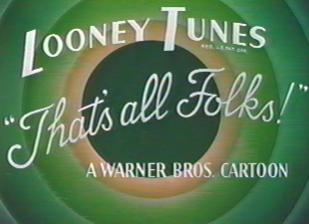They say that only the good die young. But the recent passing of Chuck Jones - artist, director, writer, actor - at age 81 seems to belie that. Then again, when we lose a gentleman like Jones, who provided so much laughter and entertainment to so many people, over so many generations - any death comes at far too young an age. We here at the Stomp Tokyo family of sites wanted to do something to express our appreciation, and since things like enormous statues that blot out the sky or multi-disc sets of his work with full commentary are a little outside our financial parameters at the moment, we decided to do the next best thing, and simply go on and on about how much we like his work, and why. Other offerings in this roundtable:
The setup for The Dover Boys at Pimento University; or, The Rivals of Roquefort Hall is simplicity itself, taken from the collegiate fictions and stage melodramas so popular in the early part of the century, throughout the 20s: The Dover Boys (Tom, "The fun-loving member of the trio", Dick, "A serious lad of eighteen summers, and one winter in Florida, as related in The Dover Boys in the Everglades", and Larry, "The youngest of the three jerks - er, brothers") motor about on their various velocipedes to pick up their fiancee, Dora Standpipe, at Miss Cheddar's Female Academy. That's right, one fiancee for three guys. It being the early part of the century, I am certain it is all quite innocent. On the way to their rollicking picnic, our three siblings and their lady acquaintance must perforce cycle by a Saloon of Infamous Repute (of course, they avert their eyes as they pass). But within the saloon, at a smoke-wreathed snooker table, is none other than Dan Backslide, "cad, coward, bully and thief", formerly of Roquefort Hall and the sworn enemy of the Dover Boys.
Sensing his opportunity, Dan Backslide (that's such a great villain name, you have to use both parts of it) runs outside and spots an automobile parked at the curb (or, as it was spelled in the early part of the century, "the kerb"). Immediately he addresses the camera: "A runabout! I'll steal it! NO ONE WILL EVER KNOW!!!!" (Dan Backslide's lines always tend to start at a normal level but eventually graduate to a full-bodied shout)
At the cabin, Dora beats uselessly at the barricaded door as Dan Backslide approaches - well, skulks actually, he is a villain, you know - but when Dan Backslide reaches out for her, Dora (without missing a beat in her litany of protests and calls for help) smacks him across the room with a martial aplomb that would be the envy of that Trinity woman in The Matrix. Seeing this through a nearby window - through a telescope pressed against the glass - a trusty boy scout semaphores a nearby comrade - literally nearby, he's only a few inches away - who then runs three feet to a telegraph office.
The three jer - sorry, the three brothers arrive at the lodge and, after pausing for a glee club song and rousing cheer for Pimento University, break down the door and administer to the ragged Dan Backslide yet another Thrashing of His Life, culminating in what should be a three-way punch - but the comatose villain sinks to the floor, resulting in little more than the Boys punching each other into unconsciousness. This remains one of my all-time favorite Chuck Jones cartoons, yet it features absolutely none of the Big Guns of the Looney Tunes pantheon. In fact, we shall never see any of these characters again, except perhaps as a reverent cameo in Animaniacs. No, the reason I honor this short is because in it, Chuck Jones does nothing less than create the modern cartoon.
And the jokes come machine-gun rapid, in a go-for-broke Hellzapoppin' style. There is even a running gag holdover from the vaudeville show - every so often, the action literally freezes as a comically grotesque fellow sashays across the screen to the tune of "While Strolling Through The Park One Day". This culminates in a payoff when at the end, all other males being beaten into unconsciousness, Dora Standpipe sashays into the sunset with the grotesque. Jones had played with this sort of character interruptus in the Inki shorts (funny how you hardly ever see these shorts featuring a comical pygmy hunter, innit?) with the gloomy visaged Mynah Bird that would hop through the occasional scene, bringing everything to a dead halt. Though not in heavy rotation on Cartoon Network's Acme Hour, when The Dover Boys shows up, it is well worth a look. Jones took the central parody to new heights, leavening it with the frantic absurdity and surrealism that would mark the best of his work up through the 60s. Speaking of parodies - that clumsy segue brings us to our next subject -
Though as parody, The Scarlet Pumpernickel concerns itself less with Baroness Orckzy's tale of an heroic figure who smuggles doomed noblemen out of Paris during the French Revolution than with mocking swashbucklers in general and Errol Flynn in particular (Errol is mentioned no less than three times, the Comedy Trifecta). Daffy Duck plays the title character, here a dashing highwayman with an unspecified mission in life, except to irritate the Lord High Chamberlain (Porky Pig). The Chamberlain, realizing his daughter Melissa is the Scarlet Pumpernickel's true love, arranges to marry her to the Grand Duke (Sylvester J. Cat), hoping this will flush the Pumpernickel out of hiding. As is often the case in Hollywood productions, the story behind the making of this film is more interesting than the film itself. By 1950, Daffy Duck had turned his career around, developing from a one-joke character to a better defined, cynical anti-hero. With a superb physical presence and a willingness - in fact, an obsession - to do his own, ever-more-strenuous and dangerous stunts, Duck was arguably the Jackie Chan of his day. And, like most successful performers, he had a desire to broaden his horizons, to stretch himself and his talent.
To a degree, the experiment succeeds. Duck certainly proves he has the flair and skills to be a swashbuckling hero, though his and Jones' tendency to go for the laugh (to be fair, necessitated by the format) short-circuits his heroism, at least on the surface. The Pumpernickel, for instance, never quite manages to leap from an upper story window without missing his horse or impacting painfully on the floor below. And ever the subversive, when the Pumpernickel bursts into Melissa's forced wedding (via Ye Little Olympic High Jumper - actually an enormous pin applied to his bottom) - Duck makes sure it is not the hero, but Melissa who saves the day, snatching up the Pumpernickel's broken body and hightailing it for the exit. But it is in the scenes in which Duck plays the Pumpernickel's foppish alter-ego that his true mettle as actor is revealed; he is subtle and restrained, playing on the quiet strength of the character, held in reserve for when it is needed. Well, except for the snuff-sniffing scene, which results in the patented Daffy Duck pinballing about the courtyard, going "Woo-hoo, woo-hoo, woo-hoo", except this time he's going "Ah-choo, ah-choo, ah-choo" - a splendid, sublime bit of self-parody. The
actress in the role of Melissa was only the first of many controversies
There
was also some dismay at casting Porky Pig - himself, a star of no
small stature - as the Lord High Chamberlain, basically a small
supporting role. But Pig, ever the consummate professional, gives
the role the same gravity as his star turns, proving himself The news that exploded over Variety and other trade papers was the bombastic derision of Yosemite Sam, WB's stock cartoon villain, who felt that the role was rightfully his; Duck, however, stood fast by his choice, and in retrospect it is quite the correct one: Sam was essentially a one-trick pony. He did one thing exceedingly well, and that was play Yosemite Sam. Checking his performances in other costume pieces, like Knighty-Knight Bugs only proves to hammer home the point: he may be in a suit of armor, but he is still playing a Western Desperado. This disagreement unfortunately threw the two into an extended tiff; they did not speak to each other for over thirty years, until Sam's near-fatal stroke in 1982. To his credit, Duck was one of the first by his bedside, and to this day, the two share a warm friendship, meeting every Wednesday evening to play chess and watch Law and Order*.
There are other surprising cameos sprinkled throughout Pumpernickel; Mama Bear, sensing the end of The Three Bears' contract at WB, appears as Melissa's Lady-In-Waiting. Henery Hawk (actually 45 years old at the time) is the Chamberlain's Squire; but anyone seeking proof of the golden heart that lay beneath Duck's gruff exterior need look no further than the appearance of Elmer Fudd as the Innkeeper.
If there is a weak spot in The Scarlet Pumpernickel, it is the bookending segments in which Daffy pitches the story to an executive (called "JL" - many are the theories as to who this fictional exec representives, but Duck states in his autobiography, It Was All My Idea, Mine! Mine! Mine!, that "JL" simply stands for "Jerk Loser"), who is at first noncommittal, then breathlessly involved in the story, until finally, after an apocalyptic ending involving dams breaking, volcanos erupting, and food prices skyrocketing, the executive asks "Is that all??!!" and a despondent Daffy points a gun to his head and commits suicide. The end.
This was not to be; If Duck ever felt bitter or disappointed that Jones course of action did not work as planned, he never admitted it. If anything, the experience seemed to cement their relationship. Pig, in fact, found working to Duck to be extremely rewarding, and the three went on throughout the 50s to produce some of their strongest work. And for that, at least, we can thank whoever it was that refused to green-light that feature-length Scarlet Pumpernickel. ...And in case I haven't made it plain enough, I owe a very very very very very very impossibly special thanks to Chuck Jones, who both nurtured and inspired a young mind, making such flights of fancy and babble possible. We missed you the minute you were gone, Chuck, and time has not healed that hurt one bit. Be happy, wherever you are.
RATING: You're kidding, right? The scale doesn't go that high.
- April 6, 2002 |
||||||||||
|
|

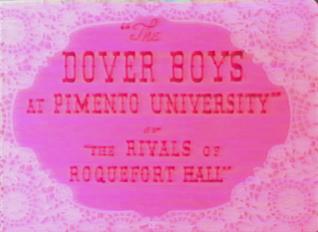
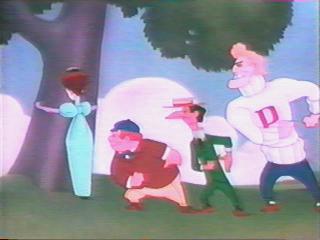 At
the picnic, our three chums (and maiden fair) decide to play a spirited
game of "Hide, Go and Seek". This means that Dora counts
while the Boys ricochet from hiding place to hiding place, shouting
to each other, "No! No! Over here! Over here!" They thus
run helter-skelter throughout the town, until finally, they agree
on the perfect hiding place: under Dan Backslide's snooker table.
At
the picnic, our three chums (and maiden fair) decide to play a spirited
game of "Hide, Go and Seek". This means that Dora counts
while the Boys ricochet from hiding place to hiding place, shouting
to each other, "No! No! Over here! Over here!" They thus
run helter-skelter throughout the town, until finally, they agree
on the perfect hiding place: under Dan Backslide's snooker table.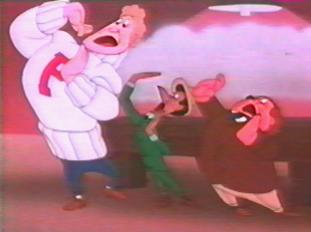 Finding
Dora still counting at the tree, he absconds with her - and the
tree, too, but he returns that after reading a chapter from the
profusely illustrated Handbook of Useful Knowledge on "How
Best To Remove Young Lady From Tree" (luckily for him, Dora
is counting to 1500 and is oblivious of these shenanigans). Dan
Backslide is also sporting enough to stop the runabout at the Saloon,
so Dora can shout through the window, "Help Tom! Help Dick!
Help Larry!" before he escapes with her to a hunting lodge
in the mountains. The Boys leap up in the approved Delsart Stage
Position For Registering Shock and Dismay.
Finding
Dora still counting at the tree, he absconds with her - and the
tree, too, but he returns that after reading a chapter from the
profusely illustrated Handbook of Useful Knowledge on "How
Best To Remove Young Lady From Tree" (luckily for him, Dora
is counting to 1500 and is oblivious of these shenanigans). Dan
Backslide is also sporting enough to stop the runabout at the Saloon,
so Dora can shout through the window, "Help Tom! Help Dick!
Help Larry!" before he escapes with her to a hunting lodge
in the mountains. The Boys leap up in the approved Delsart Stage
Position For Registering Shock and Dismay.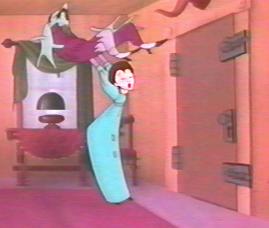 The
telegraph reaches the Dover Boys still frozen in Shock and Dismay
at the Saloon. The telegraph, read in one hurried breath by the
messenger: "Mssrs. Tom Dick and Larry care of Wayward Tavern
Upper Bottleneck New York quote HELP!!!! unquote signed Dora
Standpipe 35 cents collect please." The Boys trample the wretch
in their rush to his bicycle (conveniently built for three) and
immediately set out for the hunting lodge. Dan Backslide, meantime,
upon his third encounter with Dora's fighting prowess, is bloody,
beaten, and himself shouting "Help, Tom! Help, Dick! Help,
Larry!"
The
telegraph reaches the Dover Boys still frozen in Shock and Dismay
at the Saloon. The telegraph, read in one hurried breath by the
messenger: "Mssrs. Tom Dick and Larry care of Wayward Tavern
Upper Bottleneck New York quote HELP!!!! unquote signed Dora
Standpipe 35 cents collect please." The Boys trample the wretch
in their rush to his bicycle (conveniently built for three) and
immediately set out for the hunting lodge. Dan Backslide, meantime,
upon his third encounter with Dora's fighting prowess, is bloody,
beaten, and himself shouting "Help, Tom! Help, Dick! Help,
Larry!"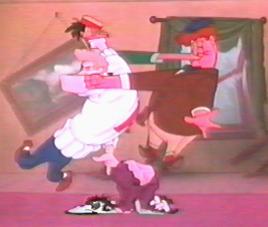 Jones
initially conceived The Dover Boys as an exercise in stylized
movement, and created a codex of cartoon shortcuts that would rule
Warner Brothers Animation for the next twenty years. In Jones' earlier
works - for instance the Sniffles or Two Curious Puppies shorts
- we still see a hangover from Disney-style animation: movement
is still semi-realistic. If a character moves from Point A to Point
B in a room, we shall see him amble across the room, much as you
or I. But in The Dover Boys, the characters are on rocket
fuel; the distance between A and B is covered in a blur of a few
frames' length, and the character comes to a complete, dead stop
to hit the next joke. When Dan Backslide proclaims that the accursed
Dover Boys drive him to drink, he practically teleports to the bar
to down half a hundred shots in a few seconds' time (interrupted
only by the bartender taking a shot midway through the bit - it
takes a steady comic hand to know when to break a pattern).
Jones
initially conceived The Dover Boys as an exercise in stylized
movement, and created a codex of cartoon shortcuts that would rule
Warner Brothers Animation for the next twenty years. In Jones' earlier
works - for instance the Sniffles or Two Curious Puppies shorts
- we still see a hangover from Disney-style animation: movement
is still semi-realistic. If a character moves from Point A to Point
B in a room, we shall see him amble across the room, much as you
or I. But in The Dover Boys, the characters are on rocket
fuel; the distance between A and B is covered in a blur of a few
frames' length, and the character comes to a complete, dead stop
to hit the next joke. When Dan Backslide proclaims that the accursed
Dover Boys drive him to drink, he practically teleports to the bar
to down half a hundred shots in a few seconds' time (interrupted
only by the bartender taking a shot midway through the bit - it
takes a steady comic hand to know when to break a pattern).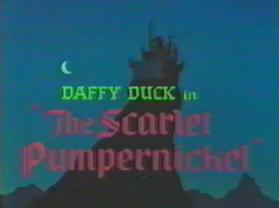
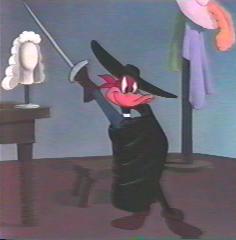 Unfortunately
his first attempt to make his dream project - a much more forthright
and faithful version of The Scarlet Pimpernel - was unsuccessful.
Though he was a proven moneymaker in short subjects, Duck was untried
as the star of a feature, and his unswerving demands that he also
be allowed to direct did not exactly advance the cause. It was Chuck
Jones, ever the peacemaker and diplomat, who met with Duck in his
trailer and convinced his often-volatile star (who was on the verge
of walking out on his contract) to channel his desires into a short
subject, as a sort of audition to the Studio Powers That Be, hopefully
proving that Duck was capable of delivering on his promises. With
the added promise of creative control, Duck agreed.
Unfortunately
his first attempt to make his dream project - a much more forthright
and faithful version of The Scarlet Pimpernel - was unsuccessful.
Though he was a proven moneymaker in short subjects, Duck was untried
as the star of a feature, and his unswerving demands that he also
be allowed to direct did not exactly advance the cause. It was Chuck
Jones, ever the peacemaker and diplomat, who met with Duck in his
trailer and convinced his often-volatile star (who was on the verge
of walking out on his contract) to channel his desires into a short
subject, as a sort of audition to the Studio Powers That Be, hopefully
proving that Duck was capable of delivering on his promises. With
the added promise of creative control, Duck agreed.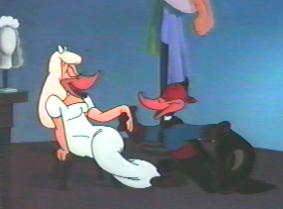 concerning
Duck's casting for his magnum opus. Her only credits are
for several of Duck's shorts, and starlet Morgana Lopez doesn't
have much of a chance here to show anything beyond her talents for
simpering and crying. Many contemporary accounts hold that she was
actually a compelling actress, held back only by the unfortunate
fact of her species. She and Duck shared a bungalow -and some claim,
much more - at Warner's for several years, until she eventually
tired of the heartless nature of the film industry and left to seek
fulfillment elsewhere. She proved to be a talented journalist, and
became an associate of Helen Gurley Brown, writing a well-received
column in the early years of Ms. magazine. Currently, she
operates a home for retired racing greyhounds in Kalamazoo ("The
Funniest City In America"), and though she has fond memories
of Daffy, also claims that she has never missed what she refers
to as "That pile of (unprintable) people call Hollywood".
concerning
Duck's casting for his magnum opus. Her only credits are
for several of Duck's shorts, and starlet Morgana Lopez doesn't
have much of a chance here to show anything beyond her talents for
simpering and crying. Many contemporary accounts hold that she was
actually a compelling actress, held back only by the unfortunate
fact of her species. She and Duck shared a bungalow -and some claim,
much more - at Warner's for several years, until she eventually
tired of the heartless nature of the film industry and left to seek
fulfillment elsewhere. She proved to be a talented journalist, and
became an associate of Helen Gurley Brown, writing a well-received
column in the early years of Ms. magazine. Currently, she
operates a home for retired racing greyhounds in Kalamazoo ("The
Funniest City In America"), and though she has fond memories
of Daffy, also claims that she has never missed what she refers
to as "That pile of (unprintable) people call Hollywood".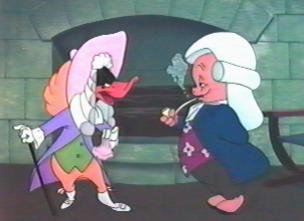 a
serious and dependable character actor. But the largest controversy
surrounded Daffy's casting of Sylvester as the Grand Duke, the Sir
Guy of Gisbourne of this re-imagined Pimpernel.
a
serious and dependable character actor. But the largest controversy
surrounded Daffy's casting of Sylvester as the Grand Duke, the Sir
Guy of Gisbourne of this re-imagined Pimpernel.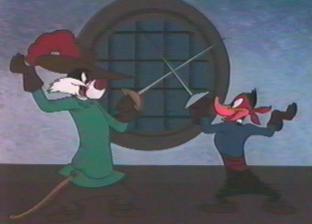 On
the other hand, Duck knew Cat was the proper actor for the role,
hearkening back to their college days. Both classically trained
Shakespearean actors, the two had appeared in a student production
of Hamlet in 1932. Reviews of the period are harsh in their
opinion of Duck's Melancholy Dane, calling it "possibly the
most bitter and cynical Hamlet ever", but praise was
universal for the final duel scene, in which Duck and Cat (playing
Laertes) squared off for a full half-hour, "a swordfight
filled with physical pyrotechnics and amazing acrobatics, which
left the audience as exhausted as the participants," wrote
one critic.
On
the other hand, Duck knew Cat was the proper actor for the role,
hearkening back to their college days. Both classically trained
Shakespearean actors, the two had appeared in a student production
of Hamlet in 1932. Reviews of the period are harsh in their
opinion of Duck's Melancholy Dane, calling it "possibly the
most bitter and cynical Hamlet ever", but praise was
universal for the final duel scene, in which Duck and Cat (playing
Laertes) squared off for a full half-hour, "a swordfight
filled with physical pyrotechnics and amazing acrobatics, which
left the audience as exhausted as the participants," wrote
one critic.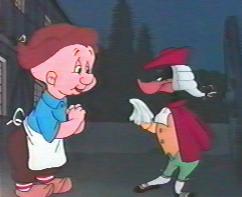 Named
in the first round of Sen. Joseph McCarthy's Communist witch hunts,
Fudd had joined with others like Bertolt Brecht, Jose Ferrer, Zero
Mostel and Arthur Miller in protesting and fighting the false allegations;
they did this to the detriment of their careers, and Fudd in particular
hadn't worked in well over a year. Duck bravely managed to insert
Fudd into this role - he's the only human in the entire picture
- allowing Fudd to retain his Screen Actor's Guild health insurance,
a necessity for the medications Fudd requires on a daily basis for
diabetes and Parkinson's (in fact, Fudd's unwavering bravery and
resolve in the face of so many health problems, not to mention allegations
about his politics and sexuality, would fill a book on their own).
Named
in the first round of Sen. Joseph McCarthy's Communist witch hunts,
Fudd had joined with others like Bertolt Brecht, Jose Ferrer, Zero
Mostel and Arthur Miller in protesting and fighting the false allegations;
they did this to the detriment of their careers, and Fudd in particular
hadn't worked in well over a year. Duck bravely managed to insert
Fudd into this role - he's the only human in the entire picture
- allowing Fudd to retain his Screen Actor's Guild health insurance,
a necessity for the medications Fudd requires on a daily basis for
diabetes and Parkinson's (in fact, Fudd's unwavering bravery and
resolve in the face of so many health problems, not to mention allegations
about his politics and sexuality, would fill a book on their own).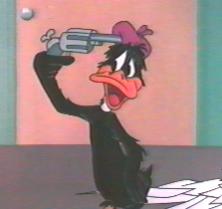 It
is a bitter, confrontational ending, and we may be certain that
Duck insisted on the inclusion of these bookends as his nose-thumbing
(or in this case, beak-thumbing) at the very executives who had
denied him the chance to make a real movie. This has worked
against him in many ways; just because these days, the gunshot is
edited out (because it has been scientifically proven that American
children are so relentlessly stupid that they will do anything they
see in cartoons), but the executives had the last laugh: invoking
a little-known codicil in both their contracts, Duck was not allowed
to take any credit in the creation of The Scarlet Pumpernickel,
though Jones endlessly argued for at least a "Directed by Charles
M. Jones and Daffy D. Duck".
It
is a bitter, confrontational ending, and we may be certain that
Duck insisted on the inclusion of these bookends as his nose-thumbing
(or in this case, beak-thumbing) at the very executives who had
denied him the chance to make a real movie. This has worked
against him in many ways; just because these days, the gunshot is
edited out (because it has been scientifically proven that American
children are so relentlessly stupid that they will do anything they
see in cartoons), but the executives had the last laugh: invoking
a little-known codicil in both their contracts, Duck was not allowed
to take any credit in the creation of The Scarlet Pumpernickel,
though Jones endlessly argued for at least a "Directed by Charles
M. Jones and Daffy D. Duck".